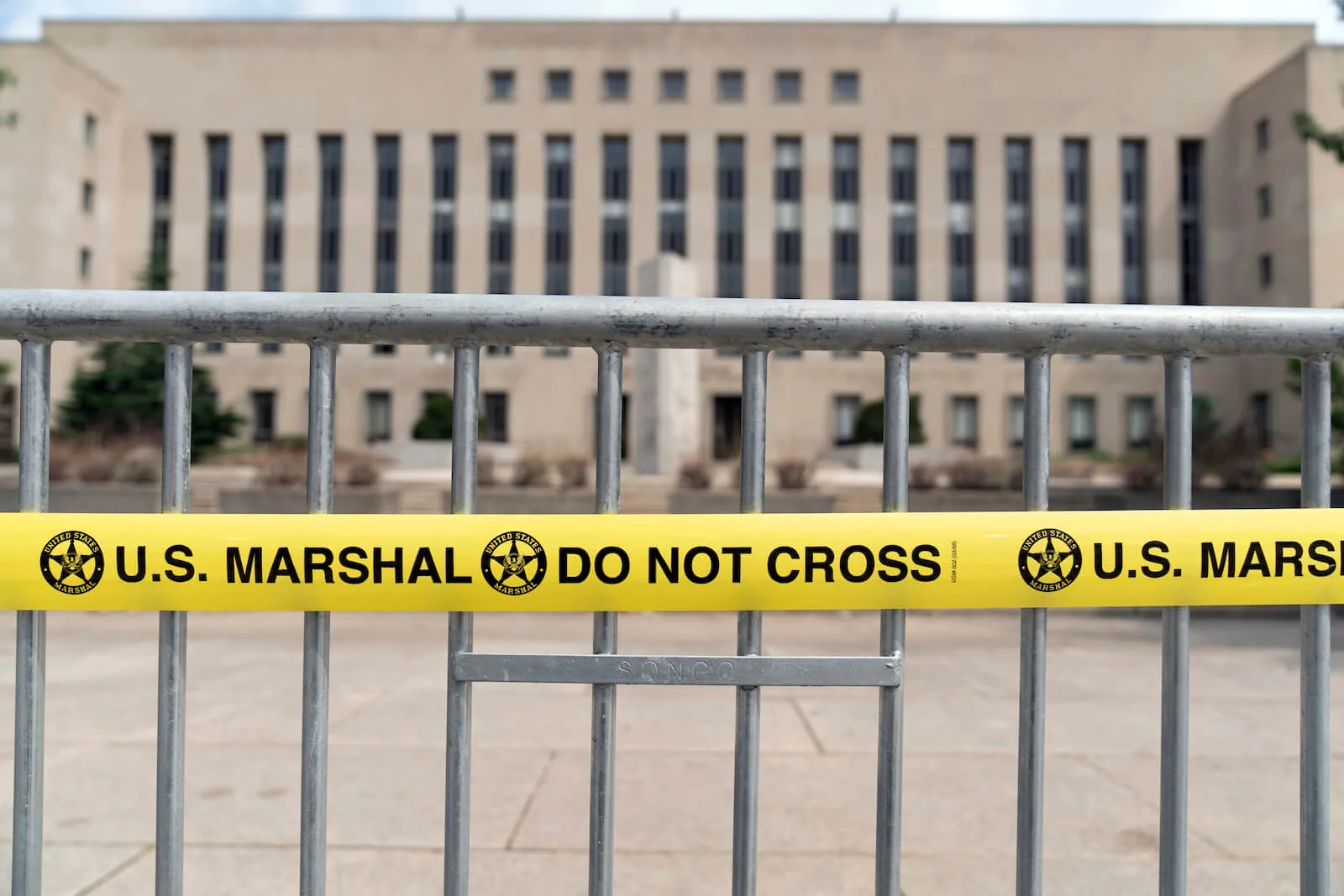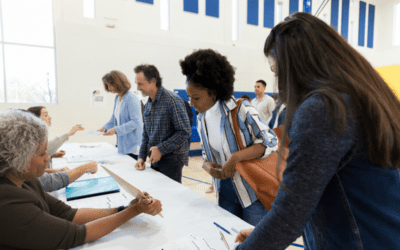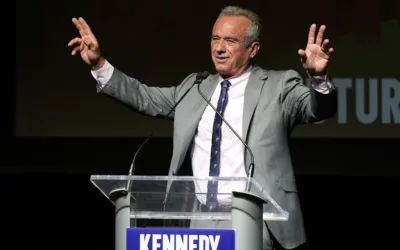
The E. Barrett Prettyman US Federal Courthouse is seen behind barricades, before the arrival of former President Donald Trump, Thursday, Aug. 3, 2023, in Washington. (AP Photo/Jose Luis Magana)
The former president pleads not guilty while adding another hearing date to a burgeoning legal calendar involving three criminal cases—with the possibility of a fourth on the way.
Donald J. Trump, the 45th president of the United States, is now an accused felon facing criminal charges related to his efforts to overturn the results of the 2020 presidential election through actions that included advisors and fake electors from Wisconsin.
Flying into Washington, DC Thursday afternoon on his private 757 jet—the type usually populated with nearly 300 commercial passengers rather than one—the former president was then motorcaded to a federal courthouse near the US Capitol, the scene of a deadly insurrection on January 6, 2021 that was prompted by Trump’s intentional lies about election irregularities. A jury will be asked to decide if the conspiracy—involving repeated falsehoods, fake electors, and urging a mob to march to where Congress was in session—rises to the level of criminal activity.
The indictment filed by special counsel Jack Smith outlines a months long effort to “impair, obstruct, and defeat” the process for counting electoral votes that showed President Joe Biden to be the rightful winner.
Some participants in the scheme—including the Wisconsin slate of Trump’s fake electors—said they believed they were simply helping him provide a legal backstop in case irregularities were found in how votes were cast and counted. But even after dozens of Trump legal challenges failed to show any significant fraud, the campaign attempted to use the fake electors’ paperwork as leverage to delay or upend the ceremonial counting of electoral votes during the joint session of Congress that was interrupted by the riot.
The indictment notes that a recount of Wisconsin’s votes was completed on November 29, 2020 and affirmed Trump’s narrow loss to Biden. That did not stop Trump’s campaign from designing plans to circumvent the final results.
Prosecutors point to a November 2020 memorandum from attorney Kenneth Chesebro, who was assisting the Trump campaign at the time with legal challenges, that advocated for Trump supporters in Wisconsin to meet and cast an electoral ballot for him, in case the campaign’s litigation in the state succeeded. But “the memoranda evolved over time from a legal strategy to preserve [Trump’s] rights to a corrupt plan to subvert” the election “by stopping Biden electors’ votes from being counted and certified.”
A December 6 memorandum suggested fake Trump electors meet in some purportedly “contested” states—Arizona, Georgia, Michigan, New Mexico, Nevada, Pennsylvania and Wisconsin—and ”should meet and mimic as best as possible the actions of the legitimate Biden electors.” One of the memo’s recipients was attorney Jim Troupis of Dane County, who was advising the Trump campaign on post-election legal matters in Wisconsin.
Wisconsin’s fake electors met in the state Capitol in Madison the same day as the Biden electors cast official votes in the governor’s office. Despite COVID restrictions that prevented most visitors, the fake electors were granted access to a room reserved by US Rep. Scott Fitzgerald, then the state Senate’s Republican leader.
The false electors slate was comprised of:
- Wisconsin Elections Commission member Bob Spindell
- Then-Wisconsin GOP Chair Andrew Hitt
- 8th Congressional District GOP Chair Kelly Ruh
- 1st Congressional District GOP Vice Chair Carol Brunner
- Midwest Region for the Republican National Committee Vice Chair Mary Buestrin
- 6th Congressional District GOP Chair Darryl Carlson
- La Crosse County GOP Chair Bill Feehan
- Dane Party GOP Chair Scott Grabins
- 5th Congressional District GOP Chair Kathy Kiernan
- 1st Congressional District GOP Vice Chair Pam Travis
As Trump’s case moves to trial, there will be other Wisconsin connections to the election plot and the activities surrounding the insurrection.
Conservative activist Cleta Mitchell—then a partner with Milwaukee law firm Foley & Lardner—suggested finding legal justification for state legislatures to designate electors, rather than voters. Mitchell was later part of a now-infamous phone call in which Trump tried to pressure the Georgia secretary of state to “find” him 11,780 votes in order to claim victory over Biden there. She resigned from the firm after her role was made public. More recently, Mitchell called on conservatives to do more to limit on-campus voting for college students.
Sen. Ron Johnson—who entertained election conspiracies during a Senate hearing in December 2020, even though he had admitted in an earlier phone call that he knew Biden won and it would be political suicide to say so publicly—may have been moments away from delivering the fraudulent ballots of the fake electors to Vice President Mike Pence, who was presiding over the ceremonial joint session.
Johnson said he was contacted that morning by Troupis, about getting “a document on Wisconsin electors to [Johnson] and the VP immediately.” Johnson’s then-chief of staff reached out to a Pence staffer who flatly rejected the proposed handoff.
Trump’s “Big Lie” to cast doubts on the election results and the credibility of the Biden presidency was also abetted by Fitzgerald and US Rep. Tom Tiffany who voted to deny the lawfully cast votes submitted and certified by other states—just hours after order had been restored to the now-damaged Capitol. Tiffany also supported a Texas lawsuit to disregard Wisconsin voters and simply award the state’s electoral votes to former President Trump.
Back in court, Magistrate Judge Moxila Upadhyaya read the four counts aloud to Trump, including maximum sentences ranging from five to 20 years in prison. Asked for pleas to each one, Trump responded, “Not guilty.” She then set the next hearing date for the morning of August 28.
Along with this case in the nation’s capital, Trump is also awaiting trial in Miami on federal charges of mishandling government documents with national security information—and in New York where he is charged in connection with hush money payments to keep an extramarital affair from becoming public prior to his narrow election in 2016. Trump may also soon face criminal charges in a fourth location, for his attempt to undermine the election in Georgia.
The former president then left a courthouse guarded by a phalanx of law enforcement officers from agencies including the US Capitol Police and Washington, DC’s Metropolitan Police Department—which together lost five of its members to injuries or suicide in an attack that also injured more than 150 other officers.
The Associated Press contributed to this story.
Support Our Cause
Thank you for taking the time to read our work. Before you go, we hope you'll consider supporting our values-driven journalism, which has always strived to make clear what's really at stake for Wisconsinites and our future.
Since day one, our goal here at UpNorthNews has always been to empower people across the state with fact-based news and information. We believe that when people are armed with knowledge about what's happening in their local, state, and federal governments—including who is working on their behalf and who is actively trying to block efforts aimed at improving the daily lives of Wisconsin families—they will be inspired to become civically engaged.


New Biden rules deliver automatic cash refunds for canceled flights, ban surprise fees
In the aftermath of a canceled or delayed flight, there’s nothing less appealing than spending hours on the phone waiting to speak with an airline...

One year on the Wienermobile: The life of a Wisconsin hotdogger
20,000+ miles. 16 states. 40+ cities. 12 months. Hotdogger Samantha Benish has been hard at work since graduating from the University of...

Biden makes 4 million more workers eligible for overtime pay
The Biden administration announced a new rule Tuesday to expand overtime pay for around 4 million lower-paid salaried employees nationwide. The...

‘Radical’ Republican proposals threaten bipartisan farm bill, USDA Secretary says
In an appearance before the North American Agricultural Journalists last week, United States Department of Agriculture (USDA) Secretary Tom Vilsack...





